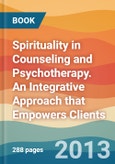"Written with great clarity and intelligence, this book will be of benefit to all mental health practitioners, students of psychology, and those seeking a better understanding of their own process of psychological and spiritual transformation."
Tara Brach, PhD, Author of Radical Acceptance and True Refuge
"In this wonderful book, Rick Johnson weaves together different theoretical perspectives in a way that welcomes religion, spirituality, and nature into the counseling and psychotherapy process. It′s a delight to read Dr. Johnson′s approach an approach that teaches therapists how to empathically explore spirituality as an important dimension of human existence."
John Sommers–Flanagan, PhD, coauthor of Counseling and Psychotherapy Theories in Context and Practice and Clinical Interviewing
"Rick Johnson′s book Spirituality in Counseling and Psychotherapy is a rich introduction to the varied forms in which spiritual suffering enters the consulting room, the range of theories which address or fail to address this need, and specific attitudes and practices through which therapists can provide a non–doctrinal but open encounter with the spiritual needs of their clients."
James Hollis, PhD, Jungian analyst, and author of fourteen books, among them What Matters Most: Living a More Considered Life
A practical integration of psychology and spirituality that builds upon existing psychological theories
While many clients want spiritual and philosophical issues to be addressed in therapy, many mental health professionals report that they feel ill–equipped to meet clients′ needs in this area. Providing a model that is approachable from a variety of theoretical orientations, Spirituality in Counseling and Psychotherapy supports therapists in becoming open to the unique ways that clients define, experience, and access life–affirming, spiritual beliefs and practices.
Drawing on the author′s research into spiritual issues as well as predictors of clients′ psychological health, this reflective book presents an integrative approach to discussing the topic of spirituality. An essential resource for mental health professionals of all spiritual and religious persuasions, Spirituality in Counseling and Psychotherapy discusses:
- Client–defined spirituality
- Integrating spirituality with psychological theories
- Why clients become spiritually lost
- Practical steps for spiritual health and abundance in therapy
- Helping clients reclaim their real self
- How spiritually oriented therapy helps
- Guidance for therapists in differentiating their spirituality from their clients′ to foster a more successful therapeutic relationship
Filled with numerous cases and stories illustrating how spirituality can be a natural and beneficial part of the therapeutic process, Spirituality in Counseling and Psychotherapy enables mental health professionals to nonjudgmentally invite a collaborative exploration of the role of spirituality in their clients′ lives.
Table of Contents
Preface xiii
Acknowledgments xxi
About the Author xxiii
1 Spiritual Competencies and Premises 1
Central Premises 5
Spirituality and Religion 20
2 Client–Defined Spirituality 23
Remembering 28
External Presence and Inner Knowing 29
Transcendent and Ordinary Experiences 31
Present Moment Awareness 32
Interconnectedness 33
Love and Fear 35
Free Will 36
Creativity and Artistic Expression 38
Nature and Natural Beauty 39
Openheartedness 40
Personal Relationship 41
Thematic Integration 42
3 Integrating Spirituality With Psychological Theories 45
Freud 45
Jung 46
Object Relations and Attachment Theories 48
Interpersonal Theory: Horney 51
Humanism: Rogers 52
Control–Mastery Theory: Weiss 54
Internal Family Systems Theory: Schwartz 57
Dialectical Behavior Therapy: Linehan 59
Transpersonal and Integral Theories 60
Life Span Development Th eories 62
Thematic Integration 65
4 Getting Lost: Psychological and Spiritual Perspectives 69
Why Clients Get Lost 71
A Spiritual Perspective 87
5 Spiritual Health and Abundance: Practical Steps 101
Being Open to Client–Defined Spirituality 101
Utilizing Spirituality for Resourcing 109
Inviting Spirituality to Inform Personal Integrity 111
Evaluating Life Structures 113
Remembering and Committing to Spiritual Practice 123
6 Integrating the Shadow 125
The Shadow 126
How Shadows Form 129
When Clients Marry Their Shadow 134
Integration 141
7 Self and No–Self 149
No–Self 150
An Integration of Self and No–Self 157
Helping Clients Reclaim Their Real Self 160
8 How Spiritually Oriented Therapy Helps 169
A Collaborative Team 172
Self–Awareness 174
Insight 179
Reexperiencing Relational Dynamics 181
New Relationship With the Real Self 184
Embracing Inner Health 187
Embracing Relationship Health 189
Utilizing Spiritually Oriented Th erapy 190
Final Thoughts 193
9 Spiritual–Differentiation 195
The Identity and Differentiation Process 196
Characteristics of Well–Differentiated Individuals 201
Increasing Differentiation 213
Increasing Therapist Spiritual–Differentiation 217
References 223
Author Index 245
Subject Index 249








